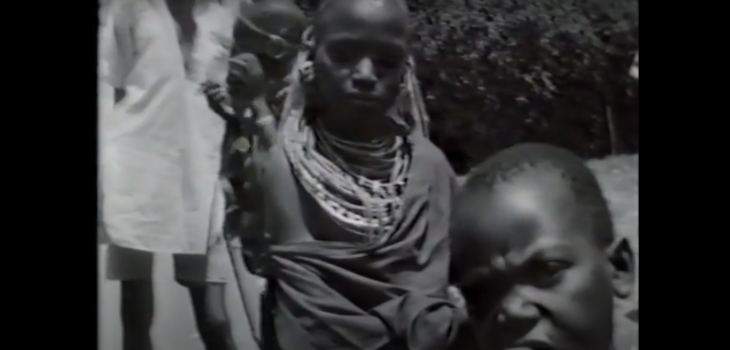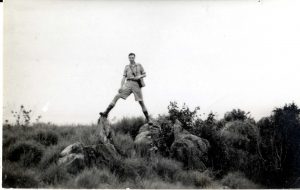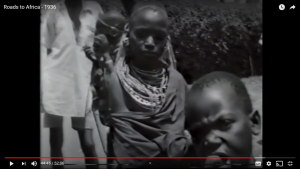By Lioba Hirsch, Research Fellow, Faculty of Department of Public Health, Environments and Society, LSHTM, with poem by Parise Carmichael-Murphy
The LSHTM Archives contain a multitude of documents and materials, which reflect the white gaze. Working in the archives, and especially when researching the school’s work during British colonialism, one is confronted with the racist views of past members of staff, their attitude to research subjects of colour and the people inhabiting the regions in which a lot of LSHTM’s research took place. The Leeson collection, containing the documents of and pertaining to LSHTM entomologist H.S. Leeson (1893 – 1957) is just one such example.
In a previous blog, Archives Assistant Leila Sellers had already begun the work of critically revisiting one item in this collection: the Roads to Africa film. The film, which shows scenes from a 1936 research expedition by Leeson and his assistant David Gillett, is a powerful example of how fundamental a part racism was in upholding colonialism and how it in turn structured the research encounter between these two white researchers and the lands and people they met. Leila Sellers’ analysis points to this. She writes:
‘It can be argued that Roads to Africa renders visible the presence, and in some instances the individual identities, of people colonised by the British in early twentieth century Africa. However, on closer inspection, the nature of these interactions between colonised and coloniser only serves to further highlight the power imbalance between the two groups. Throughout the film Gillett and Leeson never move beyond treating the people they encounter with a kind of detached curiosity, and there is little or no attempt to understand or communicate with them on an equal footing.’
Now we would like to take this critical engagement a step further. As part of the Wellcome Trust-sponsored Black Health and the Humanities project at the University of Bristol, Dr Lioba Hirsch who works on LSHTM’s colonial history project showed the film to PhD and early career researchers and asked them to creatively engage with it. The idea was to use creative writing to imagine the position of Black and Brown people, which we encounter in the archives and whose voices are often silenced and marginalised. The exercise was one of care: to spend some time thinking about and with the people whose archival encounter is too often dominated by the white gaze. One of the Black Health and the Humanities workshop participants, Parise Carmichael-Murphy wrote a poem in response to one scene in the movie in which David Gillett tries to film young women/girls from his car.
They Came, We Saw, I Wondered
They seemed lonely, and they couldn’t pronounce our names
Their car was shiny, but it was filled with too many belongings
Their food was made in haste and they ate in an uncomfortable position
They brought loud noises, and it was ugly.
We were at the market when they hid in their car
We laughed as they tried to take our picture
But we were uncomfortable, so we walked in haste
We thought it was rude, and their camera was ugly.
I wondered why they came and what they wanted to see?
I saw loneliness on their faces as I danced freely
I wondered why they thought it was okay to take my picture?
I think they wanted to capture my beauty.
Parise Carmichael-Murphy (Twitter: @Parise_CM.)
The Archives team are so pleased with this creative response to the Roads to Africa film, please contact us if you would like more information on the film or to view a copy, email: archives@lsthm.ac.uk









